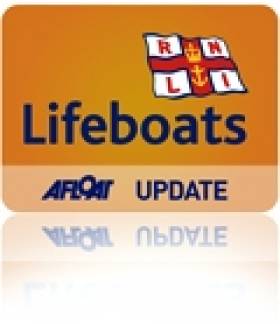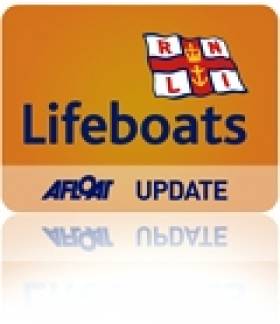Displaying items by tag: ILB
The incident occurred shortly after 10pm when the man was walking on a sandbank approximately one mile from Strand Road in Sandymount when he became aware that he was cut-off by the rising flood tide. The Irish Coastguard service that co-ordinates marine rescue received a phone call from the casualty and the inshore lifeboat was launched at 10.20pm.
A search involving Gardai and coastguard shore units was already underway and the ILB began combing the area with the assistance of searchlights and white parachute flares. The casualty relayed his position to the ILB crew via the Dublin Coastguard radio service and was located within 20 minutes.
The ILB crew took the casualty on board and brought him to Dun Laoghaire one hour after the call-out. He was unhurt in the incident and did not require hospital attention.
The new inshore lifeboat was named "Realt Na Mara" by broadcaster Pat Kenny and his wife Cathy at a ceremony last Saturday. The €35,000 craft was donated privately and this evening's call was the second today. Earlier, four people on a small powerboat got into difficulties off Bulloch Harbour in Dalkey.
Tonight's incident is not an infrequent occurrence as the sandbanks on Sandymount Strand have tricked other walkers in the past as the incoming tide floods the lower-lying beach area closer to the shore and depths become impossible to walk, especially in surf.
"The casualty was very lucky to escape injury or worse," commented Stephen Wynne, Lifeboat Operations Manager at Dun Laoghaire RNLI. "There was less than two hours remaining before high-water but at that stage the sandbank would have been completely covered. Sea-temperatures on the East Coast are still less than ten degrees and the chances of survival would have been slim".
Howth Lifeboat Rescues Three Vessels
The Inshore Lifeboat (ILB) was just returning to the safety of the harbour with two motorboats in tow, when the larger All Weather Lifeboat (ALB) was requested to the aid of a fishing trawler that had also experienced technical failure.
The second motorboat under tow by the voluntary ILB crew suffered engine failure whilst attempting to assist the first stricken craft. They had just reached the harbour mouth when the alarm was raised by a fishing trawler in similar circumstances.
The voluntary crew then transferred to the ALB and went to the rescue of the fishermen. All vessels were towed safely back to Howth harbour.
Patrick Brown, voluntary crewmember for Howth RNLI said:
"Luckily weather conditions were fair this evening, allowing for a speedy recovery of the boats that were in difficulty. However the light was fading at the time of the incidents, highlighting the importance of having safety flares for both commercial and pleasure craft alike. Charitable donations from the public make it possible for the RNLI to continue rescuing those in danger at sea"
Related Safety posts
RNLI Lifeboats in Ireland
Safety News
Rescue News from RNLI Lifeboats in Ireland
Coast Guard News from Ireland
Water Safety News from Ireland
Marine Casualty Investigation Board News
Marine Warnings

























































